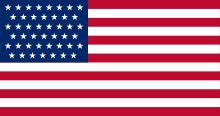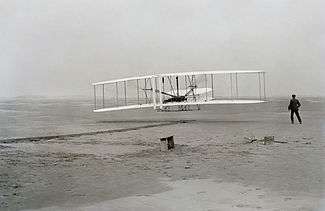1903 in the United States
| 1903 in the United States | |
|---|---|
| Years: | 1900 1901 1902 – 1903 – 1904 1905 1906 |
|
| |
 45 stars (1896–1908) | |
|
Timeline of United States history
| |
Events from the year 1903 in the United States.
Incumbents
Federal Government
- President: Theodore Roosevelt (R-New York)
- Vice President: vacant
- Chief Justice: Melville Fuller (Illinois)
- Speaker of the House of Representatives: David B. Henderson (R-Iowa) (until March 4), Joseph Gurney Cannon (R-Illinois) (starting November 9)
- Congress: 57th (until March 4), 58th (starting March 4)
Events
January–March
- January 19 – The first west-east transatlantic radio broadcast is made from the United States to England (the first east-west broadcast having been made in December 1901).
- January 21 – Section of Militia Affairs within the Adjutant General's office.
- February 11 – The Oxnard Strike of 1903 becomes the first time in U.S. history that a labor union is formed from members of different races.
- February 14
- Census Board within the Department of Commerce and Labor (Census Bureau).
- Department of Commerce and Labor founded
- U.S. Coast and Geodetic Survey transferred to the Department of Commerce and Labor.
- February 15 – Morris and Rose Mitchom introduce the first teddy bear in America.
- February 23 – Cuba leases Guantanamo Bay to the United States "in perpetuity".
- March 2 – In New York City, the Martha Washington Hotel, the first hotel exclusively for women, opens.
- March 14 – The Hay–Herrán Treaty, granting the United States the right to build the Panama Canal, is ratified by the United States Senate. The Colombian Senate later rejects the treaty.
April–June
- June 12 – The Sigma Alpha Iota International Music Fraternity is founded at the University of Michigan School of Music.
- June 14 – Heppner Flood of 1903: The town of Heppner, Oregon, is nearly destroyed by a cloudburst that results in a flash flood.
July–September
- July 1 – U.S. Bureau of Fisheries within Department of Commerce & Labor.
- July 23 – Dr. Ernst Pfenning of Chicago becomes the first owner of a Ford Model A.
- August 9 – Commanding General post replaced by that of Chief of Staff of the Army.
- September 11 – The first stock car event is held at the Milwaukee Mile.
- September 27 – The Wreck of the Old 97 engine at Stillhouse Trestle near Danville, Virginia, which kills 9 people, inspires a ballad and song.
October–December

December 17: Wright Flyer.
- October – Frank Nelson Cole proves that 267-1 is composite by factoring it as 193,707,721 * 761,838,257,287 after trying for every Sunday for 3 years.
- October 1 – The first modern World Series pits the National League's Pittsburgh against Boston of the American League.
- November 4 – With the encouragement of the United States, Panama proclaims itself independent from Colombia.
- November 13 – The United States recognizes the independence of Panama.
- November 18 – The Hay–Bunau-Varilla Treaty is signed by the United States and Panama, giving the U.S. exclusive rights over the Panama Canal Zone.
- November 23 – Colorado Governor James Hamilton Peabody sends the state militia into the town of Cripple Creek to break up a miners' strike.
- December 17 – Orville Wright flies an aircraft with a petrol engine at Kitty Hawk, North Carolina, in the first documented, successful, controlled, powered, heavier-than-air flight.
- December 30 – A fire at the Iroquois Theater in Chicago kills 600.
Undated
- The Lincoln–Lee Legion is established to promote the temperance movement and signing of alcohol abstinence pledges by children.
- The first box of Crayola crayons was made and sold for 5 cents. It contained 8 colors; brown, red, orange, yellow, green, blue, violet and black.
- Coca-Cola removes cocaine as a key ingredient from their formula. At the time, Coca-Cola contained approximately nine milligrams of cocaine per glass.
Ongoing
- Progressive Era (1890s–1920s)
- Lochner era (c. 1897–c. 1937)
Births
- March 7 – J. Allen Frear, Jr., United States Senator from Delaware from 1949 till 1961. (died 1993)
- June 22 – John Dillinger, gangster in the Depression-era United States (died 1934)
- August 7 – Joseph H. Bottum, United States Senator from South Dakota from 1962 till 1963. (died 1984)
- October 6 – Brien McMahon, United States Senator from South Dakota from 1945 till 1952. (died 1952)
Deaths
- January 4
- Gulstan Ropert, missionary (born 1839)
- Topsy elephant (born 1875)
- January 28 – John B. Allen, United States Senator from Washington from 1889 till 1893. (born 1845)
- April 22 – Alexander Ramsey, 2nd Governor of Minnesota from 1860 till 1863 and United States Senator from Minnesota from 1863 till 1875. (born 1815)
- July 3 – Harriet Lane, acting First Lady of the United States during James Buchanan's presidency (born 1830)
- September 23 – Charles B. Farwell, United States Senator from Illinois from 1887 till 1891. (born 1823)
- November 3 – Eliza Hendricks, wife of Thomas A. Hendricks, Second Lady of the United States (died 1823)
- December 13 – Alexander McDonald, United States Senator from Arkansas from 1868 till 1871. (born 1832)
- December 23 – Middleton P. Barrow, United States Senator from Georgia from 1882 till 1883. (born 1839)
See also
Further reading
- "Domestic Chronology", Statistician and Economist, San Francisco: Louis P. McCarty, 1905, pp. 227–347 – via HathiTrust. (Covers events May 1898-June 1905)
External links
-
 Media related to 1903 in the United States at Wikimedia Commons
Media related to 1903 in the United States at Wikimedia Commons
This article is issued from Wikipedia - version of the 12/1/2016. The text is available under the Creative Commons Attribution/Share Alike but additional terms may apply for the media files.